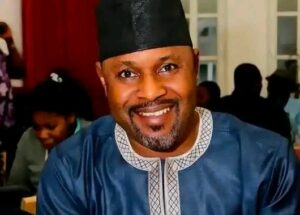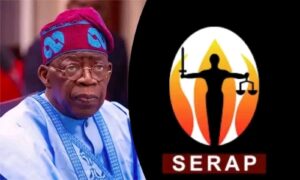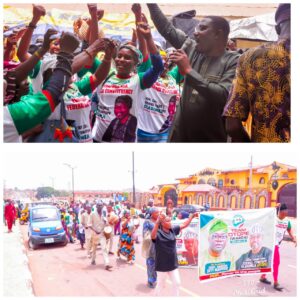While giving his Independence Day Speech on Tuesday, President Bola Tinubu disclosed his administration’s plans to hold a national conference for youths in Nigeria.

According to the president, the conference would be a platform for the Nigerian young population to dialogue and produce meaningful policies to develop Nigeria. The conference, according to the president, would last for 30 days.
ALSO READ: ‘Your Voices Are Heard’—Read Full 64th Independence Day Message of President Tinubu
“Considering this, I am pleased to announce the gathering of a National Youth Conference. This conference will be a platform to address the diverse challenges and opportunities confronting our young people, who constitute more than 60% of our population,” the president said in his speech.
“It will provoke meaningful dialogue and empower our young people to participate actively in nation-building. By ensuring that their voices are heard in shaping the policies that impact their lives, we are creating a pathway for a brighter tomorrow.
“The 30-day Confab will unite young people nationwide to collaboratively develop solutions to issues such as education, employment, innovation, security, and social justice.”
But in Nigeria, the idea of a ‘confab’ rings a political bell in the mind of anyone that has followed policy discussions before 2015.
Goodluck Ebele Jonathan, the then President of Nigeria, inaugurated a conference that gathered about 492 stakeholders including professionals in core governance areas like power, security, economics, administration, agriculture, technology, public policy, legal reforms, finance and revenue, science and technology among others.
The Confab which began on March 17, 2014, was originally scheduled for eight weeks but was extended by an additional week in May, according to a report by TheCable.
FIJ has found that the Federal Government spent at least N3.54 billion on delegates, the programme itself and other expenses to execute the conference.
There were controversies surrounding the exact amount budgeted and spent on the conference. Media reports from different sources, including TheCable and Vanguard, said that each delegate at the confab would get between N4 million and N5 million per month. Those reports also suggested that the Federal Government had allocated the sum of N7 billion in total to the conference.

FACT-CHECK: “Has Tinubu Involved in Protest Before?”
FACT-CHECK: Top 10 Worst-governed Countries in Africa 2024
Towards the end of March 2014, Mike Ozekhome, a lawyer who was a delegate at the conference, was quoted in a Vanguard report that the actual amount paid to the delegates was N3 million after the deductions of the appropriate taxes.
“From the alert from my bank, this is entirely untrue. The sum of N1,460,000 was paid in representing two weeks’ allowance. Calculated pro rata, this amounts to N2,920,000 per month. If we take this as net and assume that 10% was deducted for VAT and tax, this will still bring the gross monthly take home to be N3,212,000.
“If the deduction for tax and VAT constitutes 5% of the gross, then the monthly net take home is N3,066,000. Either way, the take home per delegate is more like N3 million, and not the exaggerated N4 Million,” Ozekhome explained.
Premium Times later exclusively reported that the Federal Government at the time had only budgeted N1.18 billion a month for the conference and that each of the delegates would only get N1.4 million monthly as against the N4 million widely circulated.
However, the cost of the conference was the least of the controversies that it generated.
THE CONFERENCE RESOLUTIONS HAVE NOT BEEN IMPLEMENTED
Despite the considerable sum of money spent on the 2014 confab, the recommendations submitted by the committees have gone through three administrations without implementation. Jonathan, in defence of his failure to implement the recommendations of the Confab, said that he did not have enough time to do so.
JUST IN: Oyo Gov’t Announces Recruitment Into State Civil Service (APPLY NOW)
Jonathan said, a public book presentation in 2022, that he did not have enough time to kickstart the implementation process and finish it.
“Whenever people say that I should have implemented its recommendations, my feeling is either those people did not understand the political environment at that time, the length of time it would take to implement the report of a conference like that or probably were just playing politics with such an important matter,” the former president said.
For Latest news and Updates, Join our WhatsApp Channel
https://whatsapp.com/channel/0029Va9qtzXHwXbIyBGtjk2o
“Those knowledgeable about the processes of constitutional reforms will know that to implement the Confab report, a number of alterations will be made in the constitution which would require the involvement of the National Assembly and state assemblies.
“Such an elaborate review couldn’t have been possible at that time because, by the time the report was submitted in August 2014, we were already on the verge of a general election.”
As president, Muhammadu Buhari said that his administration would not use the recommendations of the 2014 National Conference. On October 3, 2017, for instance, Garba Shehu, a Buhari spokesman, affirmed his principal’s stance on the confab report.
Shehu ruled out the implementation based on what he judged as a lack of inclusivity. He said this in an interview with Channels TV.
ALSO READ:
FACT-CHECK: What Nigeria’s President, Governors, Senators Really Earn
Fact Check: Is Nigeria poverty capital of the world?
RAW-FACT: Story Of June 12 And Why It Is Now Called Democracy Day In Nigeria
“It was not an inclusive conference. You very well recall that the leaders of our own party — whether ACN and all of that and the governors were missing from that conference. To make matters worse, the confab was heavily criticised but the Goodluck Jonathan administration went on with it,” Shehu said.
“This (the confab) was lopsided in terms of representation, ethnically, religiously, regionally; and they were insensitive to all of these things and then they want to force it down the throats of everyone. That is why it’s a problem.”
The Tinubu government has not been vocal about the implementation of the 2014 confab, following in the tradition of previous administrations.
‘Adopt My Plans to Stabilise Economy’, Atiku To Tinubu
Meanwhile, the confab in 2014 had some recommendations deemed controversial when they were eventually introduced to the public. One of such is the recommendation that Nigeria reverts to the old National Anthem (Nigeria, We Hail Thee).
Tinubu’s administration brought the old National Anthem back after he approved the National Assembly’s decision on May 29.
Julius Ihonvbere, majority leader of the House of Representatives, sponsored the bill that brought the anthem back. Victor Umeh, a senator representing Anambra Central, supported the bill by claiming the old anthem would “motivate” Nigerians before the Senate passed it.
The senator did not support the anthem’s reintroduction to implement a resolution from the 2014 confab.
[FIJ]








